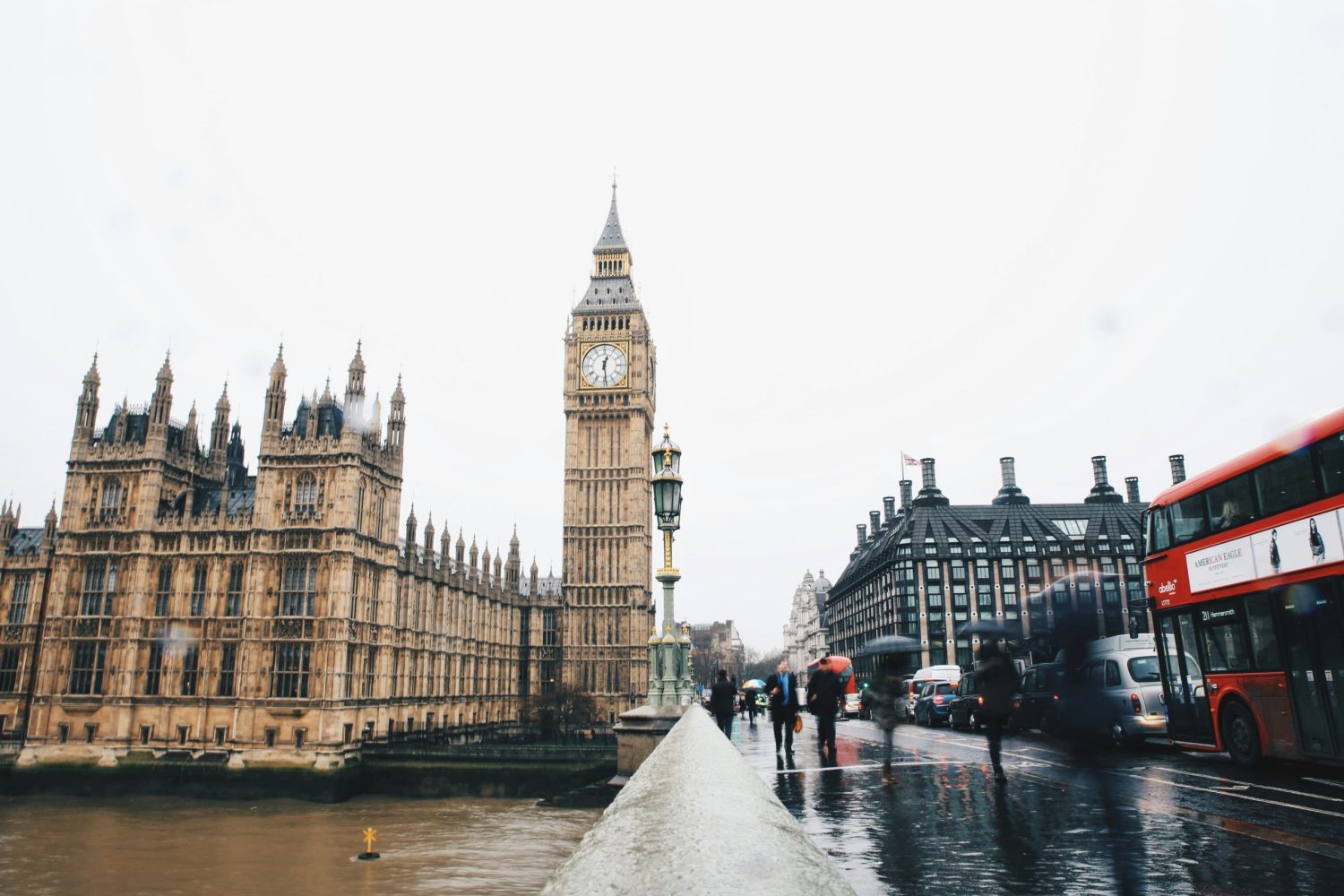For a country that isn’t much larger than a thumbnail on most globes, Britain has an outsized cultural footprint. This is, of course, in part because the footprint used to be a big clobbering boot, kicking in the doors of other people’s countries without even wiping the blood and mud off on the mat.
When I started writing my debut novel, The Ministry of Time, I mostly wrote it as a vehicle to bring my favourite 19th-century polar explorer, Graham Gore, into the 21st century, so I could shove him into situations and make him wriggle. (When you have a crush on a dead man, there’s not much else you can do to keep the relationship spicy except write about him.) But I quickly found that bringing a Victorian into contemporary Britain was more conceptually complicated than just having him exclaim approvingly at the plumbing system. How would a Victorian react to multiculturalism, feminism, decolonization? What has changed in Britain since the Empire ruled the waves—and what hasn’t? What would the British government really be doing if it had time-travel—or any other technology that brought it power unprecedented since the days of imperial rule?
If you spend any time thinking about Britain, you have to contend with a planet-harrowing imperial project, a reluctant and storied post-colonial divestment, and Britain’s contemporary striving for identity and relevance in our current, late capitalist era. If you are writing—as I am—from the position of a marginalized identity in that society, you also have to contend with the extent to which you are British and the extent to which you are Brit…ish.
Here is a fiction reading list which grapples with the chimera that is the experienced and imagined Britain. Some are gloriously trenchant state-of-the-nation novels that draw on personal experience, ranging from satire to autofiction. Others are wicked, funny, alarming speculative novels, taking the thesis of this nation to a thrilling extreme—though, with nationalism and sea levels both on the rise, they are looking increasingly plausible…
Second Class Citizen by Buchi Emecheta
This 1974 novel follows Adah, an Igbo woman from Nigeria, who emigrates to join her husband in 1960s London. The Swinging Sixties this is not; those are something that happened to other people, mostly white people. Adah’s London is stiff, parochial, barricaded in baffling rules. She is underappreciated and misunderstood by her husband, and must bring up their children in an alien atmosphere. Ethnic distinctions mean nothing to the British, to whom all immigrants are “second-class citizens.”
If this sounds like a purely tragic story, or if you expect Adah to be crushed into submission by her circumstances, think again. Buchi Emecheta’s unforced, graceful prose, and her no-holds-barred coruscating honesty, depict a woman striving passionately for joy and self-determination. Second Class Citizen is as much a novel about the emergence of a writer as it is about the experience of an immigrant to the U.K. Emecheta described this as one of her “documentary novels,” as Adah’s journey closely parallels Emecheta’s own.
Private Rites by Julia Armfield
In a country where the rain almost never stops falling, where the land is waterlogged and every valley is a lake, where the earth is sliding into the sea, where arable and burial land is frighteningly scarce, what, realistically, will people do? Well—realistically—late capitalism is late capitalism, and they still have to go to their stupid jobs every day.
Julia Armfield’s second novel follows three sisters—Isla, Irene and Agnes—who, after the death of their famed architect father, are forced to negotiate his legacy, their relationships and the climate crisis. Armfield’s vision of endtimes Britain is devastating and witty; the bloody-minded mundanity of day-to-day life is dizzyingly juxtaposed with the throat-closing horror of a climate apocalypse in full swing. Private Rites is also one of the finest novels about family ties and queerness that I’ve ever read; new love, old resentment, aching desire, and appalling loneliness thrums through its pages. I could read it a dozen times and still find some new truth about love and its succor and damages every time.

Vehicle by Jen Calleja
In a near future, the Nation (the U.K.), a conservative, xenophobic country, has cut ties with the Mainland (Europe). It is illegal to learn a foreign language or commit to unauthorized historical research. Jen Calleja’s allusive, mysterious verse novel presents a realm in the death grip of extreme nationalism, whose natural opponent is fluidity—of language, of gender, of movement.
The novel is told in overlapping strands. In 2000, a roaming archipelago known as The Islets, which vanished from the world in the twentieth century, reappears requesting aid following an ecological disaster. The Nation sends an agent, Hester Heller, a linguist and musician, under cover to the Mainland as a singer in a touring punk band, to gather information on the “Isletese Situation.” In 2050, a group of runaway researchers piece together a true account of Hester Heller’s mission, uncovering some shocking truths along the way. Vehicle somehow manages to be a formally challenging and a joyous mystery romp—a ghost hunt through the archives.

Mr. Ma and Son by Lao She, translated by William Dolby
Based on Beijinger Lao She’s own experiences teaching in London in the 1920s, this sparkling, bonkers satire of London’s Jazz Age as seen through the eyes of a pair of Chinese immigrants running an antiques shop near St. Paul’s is one of the funniest books I’ve ever read. Lao She doesn’t just satirize the peculiar rudeness, stiffness, drunkenness and meanness of the English; he’s very sharp and funny about ancien régime wannabe mandarins and romantic young first-generation idealists too. There are some hilarious scenes here, my favorite being the moment that Mrs. Wedderburn, Mr. Ma’s fastidious landlady, sews some “beautiful” Chinese characters onto her boorish flapper daughter’s hat – but she sews it upside down, so the characters read “big bastard.”
Alas, you can be as witty and as observant as you want, but racism is still brutish and painful, and the denouement of the novel reflects this. Lao She himself suffered a sad end. After returning to China, he experienced significant mistreatment and humiliation during the Cultural Revolution, eventually taking his own life in 1966. His reputation has since been restored, and there is now a major literary award given in his name to Beijing writers.
Three Rooms by Jo Hamya
The three rooms of this incredibly smart, fresh novel are three different rooms that Jo Hamya’s narrator lives in, as she moves from Oxford (where she is a research assistant) to London (where she works at a society magazine). This is a novel about searching for belonging, except this hoary tagline is given a vivid, pertinent spin: how do you find “belonging” when the rents are so high and the salaries so low that you’re being priced out of the cultural and professional journeys of discovery that typify the “search for belonging”? What narrative can be unpicked from this kind of restriction and low-level fear? Hamya never forces the point, but her clarifying acts of observation—the price of chocolate, the hours worked, the suffocating lack of space and privacy in a shared flat—are trenchant and biting. This is a brilliant document of Britain as it exists now, and very funny to boot.
High-Rise by J.G. Ballard
The 2015 film adaptation with Tom Hiddleston did not go hard enough, in my opinion. High-Rise is balls-to-the-wall bananas. It opens with Robert Laing, a recently divorced doctor, moving into a new tower block which has all the conveniences of modern (’70s—the book was written in 1975) life: grocery store, bank, hairdresser, pools, even its own school. The more affluent the tenant, the higher in the tower they live, with the building’s architect occupying the penthouse. If you think this sounds a bit obvious, I’m afraid that’s about the right level for the unsubtle British class system.
Neighborly rifts, power failures and obsessive control over the high-speed lifts soon descend into a dystopian carousel of violence, and different floors align themselves with different factions. Withdrawing from society at large, the tower block becomes a tiny, bloodthirsty ecosystem of its very own. High-Rise is a brutal and brilliant novel about class stratification and the isolating outcomes of modern social and technological landscapes taken to an orgiastic extreme.
A Lover’s Discourse by Xiaolu Guo
This novel is narrated in the first person by a young woman who leaves China for the U.K. to begin a post-graduate program. She arrives in the midst of Brexit, and a social climate of suspicion and self-involvement. She meets—at a book group where no one discusses the book—a British-German man, and the two fall in love. The novel takes its name from Roland Barthes’s A Lover’s Discourse, a fragmentary book about the imaginative state of love (and yearning), and the language and gestures used to define the state of love; but here, language and gesture differ between languages and cultures, and our narrator is in position of constant translation as part of the work of love. Britain is a rather cold, parched place in the novel, generating nothing more than a series of irritating chores for our narrator to live. It is imagined Britain—as a possible home for love—that the narrator must hope for.
Read the original article here

